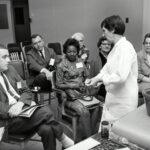Dr. Rina Patel-Jerls ate a lot of sugar. She often had cravings for carbohydrates and felt tired. She gained a lot of weight, and her face was swollen and puffy from insulin resistance. A doctor diagnosed Rina with polycystic ovary syndrome (PCOS) in 2021.
Rina, who is a pediatric and prenatal chiropractor, wondered how she could improve her life so she could have a family and live healthily.
“I think after I was sad [due to the diagnosis], I was angry,” Rina says. “Because I was just like, how could I be this holistic provider … and have all these things wrong with me? And it was just so frustrating because I wanted to be better, I wanted to do better, but I didn’t really do this to myself.”
Rina lived in Hawai’i at the time of her diagnosis, as well as during the 2021 Red Hill Bulk Fuel Storage Facility jet fuel spill, when an error by the Navy caused a fuel leak that contaminated the drinking water. By the time the Navy announced the spill, Rina had been drinking the water and showering in it twice a day for two weeks.
She and her husband Ian Jerls wanted to get pregnant, and because of her PCOS and the jet fuel spill which had potentials to complicate conception and pregnancy, she wanted to prepare her body. So, she had her hormone levels tested and found out she had high levels of prolactin, the hormone that stimulates breast development and milk production in women. She continued to get her hormones tested every two months for eight months, and the results were always the same: high prolactin levels.
The doctors told her she might have a tumor in her brain and needed to get an MRI. They also suggested she go back on hormonal birth control to balance her hormones; she told them that didn’t make sense, because she wanted to get pregnant.
So, she switched to a holistic nurse practitioner who suggested they try to balance her hormone levels naturally, through diet and supplements. Rina stopped eating dairy and gluten and started getting the correct amount of protein from red meat and chicken. After one month of eating this way and taking supplements, her prolactin tested at normal levels. After one more test, the results were the same: Her prolactin levels were normal.
“What goes into your body really does affect your hormone levels … because there’s just so much bad stuff in our food that we just don’t realize,” Rina says. “It really opened my eyes to what food is doing to us and how much it can affect your fertility journey.”
Eating with her new nutrition plan had other benefits, too: In one month of eating gluten-free and dairy-free, adding in healthy cuts of red meat and chicken, cutting down on fast food consumption and red dye 40, buying organic foods and ensuring she ate wild-caught rather than farm-raised fish, Rina became less inflamed and lost 10 pounds. Her asthma — a long side effect from COVID-19 that was exacerbated by drinking the water contaminated by the jet fuel spill — also went away.
After stabilizing her hormone levels through what she ate, it took Rina and her husband three months to get pregnant; doctors had previously told them it could take years.
Because Rina believes there should be more resources for women surrounding childbirth, she created Her Voice for ChildBirth (@hervoicecb), an Instagram platform that gives women an outlet to speak about their childbirth journeys. She is also on the board of the nonprofit Prevention and Treatment of Traumatic Childbirth (PATTCh), which works to educate physicians and families about how to prevent traumatic childbirth and better treat mothers, especially those who have experienced traumatic childbirth. She also partners with It Takes a Village, a nonprofit in Cape Girardeau that connects families with resources about childbirth and hosts free classes for mothers on topics such as natural childbirth, breastfeeding and postpartum care.
Rina says it’s important to read food labels, and the fewer ingredients a food contains, the healthier it is; if an ingredient is difficult to pronounce, it’s probably not healthy.
“Advocat[e] for yourself in that way of understanding and knowing what they’re putting into your body and what they’re giving you and things like that and the side effects, because side effects are a huge part of things,” Rina says. “And then really focus on your food, because they say, ‘Oh, it’s what you eat and what you put into your body,’ but it really is. I’m walking proof of it really is.”
Polycystic ovary syndrome (PCOS)
A hormonal imbalance condition that occurs when the ovaries create excess levels of reproductive hormones including testosterone, estrogen, luteinizing hormone, insulin and anti-müllerian hormone, which causes the reproductive hormones to become imbalanced. While the exact cause of PCOS is unknown, there is evidence that genetics play a role, and other factors that might contribute to it include obesity, higher levels of male sex hormones called androgens, insulin resistance and low-grade inflammation. There is currently no cure for PCOS. The hormone changes experienced during menopause often resolve PCOS symptoms.
Symptoms
- Irregular menstrual cycles
- Missed periods
- Unpredictable ovulation
- Enlarged ovaries
- Fluid-filled sacs with immature eggs on ovaries called small follicle cysts
- Excess hair growth on face, arms, chest and abdomen
- Acne
- Obesity
- Patches of dark skin on neck, armpits, groin and under breasts
- Skin tags, often on neck and armpits
- Thinning of hair
- Infertility
Frequency
PCOS affects 8 to 13% of reproductive-aged women, and an estimated 70% of cases go undiagnosed. In the U.S., an estimated 5 to 6 million women have PCOS.
Sources: Cleveland Clinic, Endocrine Society, Mayo Clinic, World Health Organization (WHO)
Join our Patreon community at the $5, $10 or $20 per month tiers to receive a video where you can hear Rina tell her own story.


